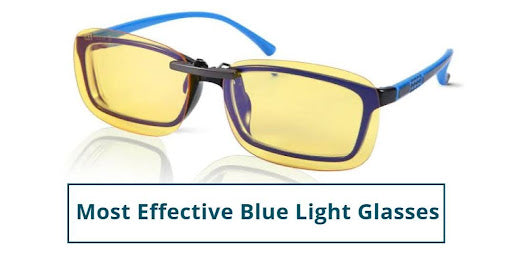
Most Effective Blue Light Glasses: A Comprehensive Guide
Ever finished a long screen session feeling like you have a “Screen hangover”? You may experience dry or strained eyes after screen time. Or, have difficulty sleeping on time.
If you’re experiencing even one of those symptoms, blue light might be the culprit. And, wearing the right kind of blue light glasses can make a huge difference.
In this post, we’ll discuss the type of blue light glasses that are the most effective for eye protection and sleep regulation. We’ll also review a couple of them so that you don’t have to do the research yourself.
Let’s dive in.
Blue Light Basics: It’s Not All Bad
The right amount of blue light at the right time is good for you. Although sunlight appears white, it’s a combination of different colors; blue light is one of them.
It occupies the low-wavelength, high-energy part of the spectrum. During the day, you need this light to stay alert and awake. It also boosts the mood.
How Too Much Blue Light Messes With Your Health
Too much of anything disturbs the natural balance, potentially causing health issues. Blue light is no exception.
Exposure to it, especially from artificial sources, like LED screens, and at night, can lead to a couple of issues.
Sleep Issues
What happens when, before bed, you expose yourself to a light that's meant to keep you awake? You stay awake.
Digital Eye Strain
When your eyes are constantly glued to screens, you tend to blink less, which increases dryness. Constant blue light exposure makes things worse, possibly adding to the strain.
How Do Blue Light Glasses Actually Help
Eyeglasses designed to block this short wavelength of light are commonly known as blue light glasses. But, how do they help? What type of tint is most effective? Let's dive deeper.
Blue light glasses come in various types. Clear-lens ones block less blue light, but they don't distort colors and are effective for daytime use.
Yellow-tinted ones block more blue light, but they aren't as effective for sleep regulation. You can wear them during the day while using screens to battle digital eye strain.
Amber tints are ideal for before-bed wear since they filter out most of the blue wavelengths with a strong filter.
Most Effective Blue Light Glasses: Features to Consider
The most effective blue light glasses are the ones that align with your needs. There are different types of them, depending on the amount of blue light they block.
To identify the right blocking filter for your eyes, you first need to understand your long-term needs.
So, ask yourself these questions:
- When do I need to wear these glasses? If it's for day use, go with clear or yellow tints.
- Do I need them to combat digital eye strain? Yellow tints often work well in this scenario.
- Should I wear them before going to bed so that blue light doesn't interfere with my sleep? Amber tints can help with sleep regulation. Wear them 2 - 3 hours before sleep.
Let's discuss some crucial factors to consider before you pull the trigger on a pair of blue light eyeglasses:
Meaningful Blue Light Blocking Percentage
Check the product description and make sure you're getting enough blue light protection without compromising visibility.
Highly tinted glasses may offer the strongest protection, but they can also distort colors. Make sure you're not getting protection at the cost of clear vision.
Amber lenses are best used before bed to address sleeplessness. Yellow and clear lenses are more suitable for day use.
Anti-Glare Coating
This coating reduces reflections bouncing off your screens. It can drastically improve clarity and comfort during long screen sessions.
UV400 Protection
Wearing a pair of blue light glasses with UV400 protection means you can protect your eyes from:
- Blue light from digital screens
- UV rays from the Sun
Comfortable, Lightweight Frames
If you sit in front of a TV or computer for extended periods, the weight and comfort of your frames matter.
Get a pair that’s lightweight and comfortable to wear, so you can wear it consistently.
Most Effective Blue Light Glasses: Our Picks
Let’s briefly talk about a couple of the most effective blue light glasses you can buy today:
Amber Wayfarer Blue Light Glasses (Black): Effectively blocks blue and green light, allowing natural production of melatonin, the sleep hormone, and improving sleep.
Amber Clip-On Blue Light Glasses (Metal): Offers comfort, convenience, and blue-light protection. Blocks sleep-disrupting wavelengths from light, regulating your circadian rhythm.
Frequently Asked Questions
Is 20% Blue Light Blocking Enough?
No, 20% blue light blocking is not enough for effective protection. Go with a pair that offers 30 - 50% for daytime and more than 90% for night wear.
What are the Best Glasses to Protect Your Eyes from Computer Screens?
The best glasses to protect your eyes from computer screens would be yellow tints with 30 - 50% blocking capability and anti-glare coating.
Is There a Difference Between Cheap and Expensive Blue Light Glasses?
Yes, cheap blue light glasses often have an ineffective coating. Quality glasses protect your eyes, reduce glare from screens, and last a long time.
How Do I Choose the Best Blue Light Glasses?
- Match tint to time (Clear for day, amber for night)
- Verify blocking percentage (30 - 50% for day, 90+ for night)
- Prioritize anti-glare and UV400 protection
Conclusion
Too much blue light, especially at night, disrupts sleep by cutting melatonin and causes eye strain.
Blue light glasses are designed to block this light. Daytime lenses are typically clearer with less blue light blocking properties, whereas nighttime lenses (Amber/red) block most of it and protect your sleep.
When buying them, look for a sufficient blocking percentage (30-50% for daytime, 90% or higher for nighttime), anti-glare coating, and UV protection.
